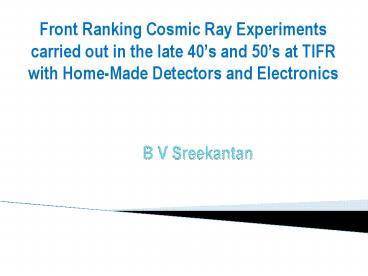B V Sreekantan PowerPoint PPT Presentation
Title: B V Sreekantan
1
B V Sreekantan
Front Ranking Cosmic Ray Experiments carried out
in the late 40s and 50s at TIFR with Home-Made
Detectors and Electronics
Panel Discussion, TIFR, Mumbai 15 January 2010
2
Mu-meson Life Time and decay spectrum (1948-51) BVS Harold Tycho working under Prof. Rossi publishes his results in Phys. Rev. Microsecond Electronics Triggered Oscilloscope Pulsed Circuits Iron Magnet All with military disposal valves brought from Chor Bazar GM counters with double-distilled alcohol as quenchers. (Nucleonic Elmore and Sands)
3
(No Transcript)
4
(No Transcript)
5
Experimental arrangement II Positive mesons
focussed into the paraffin absorber in which they
decay, by the magnetic lens M.
6
Typical oscilloscopic records of the ?-meson
decay events registered.
7
(No Transcript)
8
KGF Experiments 1st phase 1951 onwards. First Elementary Particle Conference in Bombay, Dec. 1950 KGF 2nd phase Ratio of ks to Pis (1951-53) 1954 Khandala Cloud Chamber in Railway Tunnel (200 ft) 18 cloud chamber built in TIFR workshop Intensity-Depth upto 1000 ft with Hodoscoped Telescope (BVS SN) Bhabha suggets to verify whether all underground particles are muons Angular Distribution of muons at various Depths. Cloud Chamber at depth of 100 ft in search of APPs (BVSSNPVR) ABSBVSSNPVR Search of APPs continued.
9
1954-55 MIT Echo Lake Cambridge (Mass.) HP 327 Oscilloscope Nanosecond timing made possible. Bhabha orders even before my return. Book Millimicrosecond Pulse Techniques S-particles (k?2 , k?3)
10
- Development of Chronotron Measurement of
Nanosecond Timing for Air Shower Experiments - Scintillation Counter for EAS Bombay TIFR 3rd
Floor - Ooty Raj Bhavan
- Rani and Maharani Cloud Chambers at Ooty-
S-particle Searches - Development of Spark Counters
- Cores of Extensive Air Showers
- Development of Total Absorption Spectrometer
(TASS) - Triple setup Cloud Chamber Air Cerenkov
Counter TASS - Large Cloud Chamber Largest in the World
(Miyake)
11
Photograph of a completely assembled spark
counter (a) aluminium angles to keep the plastic
frame straight (b) plastic frame 60 cm x 30 cm
(c) stainless steel plate 50 cm x 30 cm x 3 mm
(d) brass welding rods 58 cm long, 3 mm diameter.
12
Experimental arrangement to test the feasibility
of employing nuclear emulsions in conjunction
with double spark counter array for the study of
high energy jets. The coincidence G1SG2 selects
nuclear interactions produced mostly in the water
tank. The lead plates above the spark counter are
meant for the rapid development of the cascades.
The direction and co-ordinates of the jets are
given by the position of the sparks in the two
spark counters.
13
Photograph of a typical double spark event. The
sparks have occurred (shown AA) in the right
extreme compartment in both the counters. The
bright strips seen in the photograph correspond
to the portions of brass rods below the ribs of
the plastic frame illuminated for a short time,
immetiately after photographing the sparks but
before advancing the film. This serves as a
convenient reference frame for locating sparks.
14
Cloud chamber photograph of a high energy
penetrating shower proceed in the lead block
above the chamber and developing further in the
lead plates side. A spark was seen in the spark
counter in the region through which the axis of
the shower passed the spark counter.
15
An enlarged view of the section of two adjacent
layers of the spectrometer showing the details of
design of the liquid scintillation tank.
16
A cross sectional view of the total absorption
scintillation spectrometer (TASS) and the shower
detector.
17
Schematic diagram of the chronotron system for
measurement of arrival time of the hadrons signal
from TASS relative to the signal from the shower
detector CHO.
18
A block diagram of the circuitry associated with
the spectrometer.
19
Comparison of the observed time spectra for
hadrons of (10 ? 20 GeV energy with spectra
calculated using different models of high-energy
hadron collisions. The statistical errors as well
as the errors in the measured arrival time are
shown on each experimental point except the
aero-time point which is free of timing errors.
Is the average shower size and R is the
distance of the hadron from shower axis,
102, R ? 20 m. ? experimental data ---------
calculations.
20
Triple arrangement of Air Cerenkov Counter,
Multiplate Cloud Chamber and Total Absorption
Spectrometer at Ooty, for the study of
interactions of pions and protons in 10-100 GeV
range.
21
(No Transcript)
22
Core Regions of Extensive Air Showers
A cascade which develops from the first plate of
the chamber and shows a rapid absorption after
the maximum. The method of cascade widths has
been used for energy estimation which is 750 GeV.
Several cascades having elongated tube-like
structures not completely absorbed even after 20
radiation lengths. The estimated energy of the
largest cascade is 2.4 TeV.
23
- Ooty Team
- BVS SN AS PVR SL SDV TNR GTM BKC
MVS RR RHV SCT - (Miyake)
- Dinshaw Apte Khairatkar Kalagaonkar
Gonsalves Manchanda Gopal - KGF Team
- BVSSN MVS PRV KS VSN MGK KA
British Japanese
24
- Thank you

